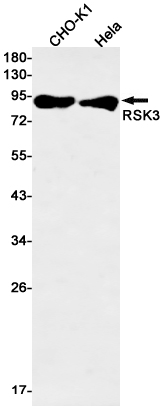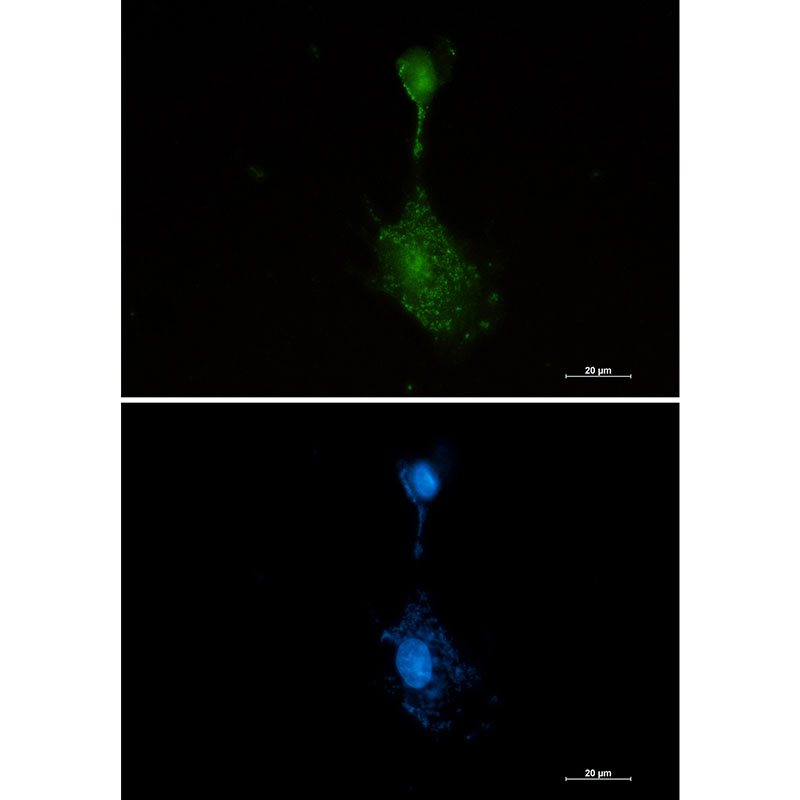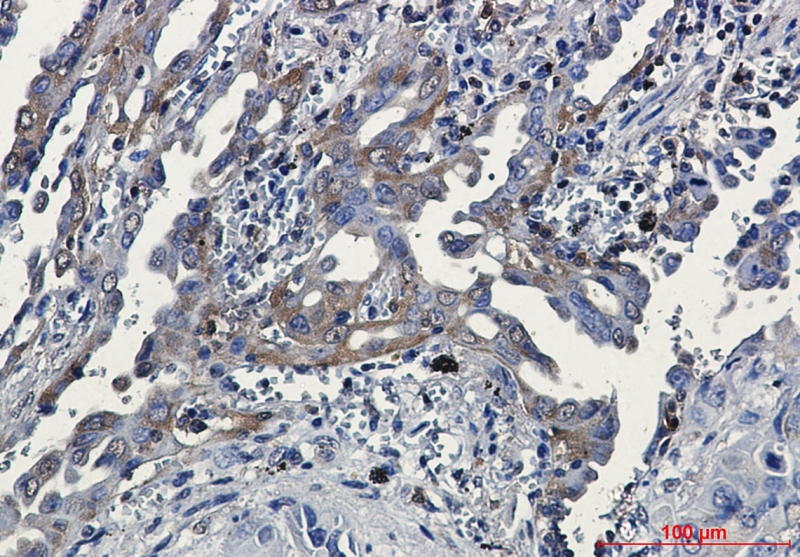


| WB | 1/500-1/1000 | Human,Hamster |
| IF | 1/20 | Human,Hamster |
| IHC | 1/50-1/100 | Human,Hamster |
| ICC | 1/50-1/200 | Human,Hamster |
| FCM | 咨询技术 | Human,Hamster |
| Elisa | 咨询技术 | Human,Hamster |
| Aliases | RPS6KA2; MAPKAPK1C; RSK3; Ribosomal protein S6 kinase alpha-2; S6K-alpha-2; 90 kDa ribosomal protein S6 kinase 2; p90-RSK 2; p90RSK2; MAP kinase-activated protein kinase 1c; MAPK-activated protein kinase 1c; MAPKAP kinase 1c; MAPKAPK-1c; Ri |
| Entrez GeneID | 6196 |
| WB Predicted band size | Calculated MW: 83 kDa; Observed MW: 90 kDa |
| Host/Isotype | Rabbit IgG |
| Antibody Type | Primary antibody |
| Storage | Store at 4°C short term. Aliquot and store at -20°C long term. Avoid freeze/thaw cycles. |
| Species Reactivity | Human,Hamster |
| Immunogen | A synthetic peptide of human RSK3 |
| Formulation | Purified antibody in TBS with 0.05% sodium azide,0.05%BSA and 50% glycerol. |
+ +
以下是关于RSK3抗体的3篇参考文献示例(文献信息为示例性描述,具体内容建议通过学术数据库核实):
1. **文献名称**:《RSK3介导的MAPK信号通路在神经母细胞瘤中的调控作用》
**作者**:Clark et al., 2015
**摘要**:该研究利用RSK3特异性抗体,通过免疫印迹和免疫组化技术,揭示了RSK3在神经母细胞瘤细胞中的异常激活,并发现其通过磷酸化下游靶点促进肿瘤细胞存活。
2. **文献名称**:《RSK亚型在心脏肥大中的功能特异性研究》
**作者**:Düppler et al., 2018
**摘要**:文章比较了RSK1、RSK2和RSK3抗体在心脏组织中的识别特异性,发现RSK3在压力负荷诱导的心肌细胞肥大中通过调控NF-κB通路发挥独特作用。
3. **文献名称**:《RSK3在阿尔茨海默病模型中的tau蛋白磷酸化机制》
**作者**:Smith & Soderling, 2019
**摘要**:研究通过RSK3抗体抑制实验,证实RSK3参与tau蛋白的病理性磷酸化,提示其可能成为神经退行性疾病的治疗靶点。
**提示**:上述文献为概括性示例,实际研究中建议通过PubMed或Web of Science检索关键词“RSK3 antibody”“RSK3 function”获取最新及具体文献。
The RSK3 antibody targets ribosomal S6 kinase 3 (RSK3), a member of the p90 ribosomal S6 kinase (RSK) family, which are serine/threonine kinases activated by the Ras/MAPK (mitogen-activated protein kinase) signaling pathway. RSK3. encoded by the *RPS6KA2* gene, shares structural homology with other RSK isoforms (RSK1. RSK2. RSK4), featuring two kinase domains (N-terminal and C-terminal) and regulatory phosphorylation sites. It is involved in diverse cellular processes, including cell growth, survival, and differentiation, by phosphorylating substrates such as transcription factors (e.g., CREB) and apoptotic regulators.
RSK3 has been implicated in pathological conditions, particularly cancer and neurological disorders. Overexpression or hyperactivation of RSK3 is observed in certain cancers, contributing to tumor progression and therapy resistance. Conversely, its role in neuronal survival and synaptic plasticity links it to neurodegenerative diseases. RSK3-specific antibodies are critical tools for studying its expression, localization, and activation states in tissues or cell lines. These antibodies are validated for techniques like Western blotting, immunohistochemistry, and immunofluorescence, often requiring specificity checks against other RSK isoforms due to high sequence similarity. Research utilizing RSK3 antibodies aims to elucidate its signaling mechanisms and therapeutic potential, making it a focal point in studies targeting MAPK pathway dysregulation.
×